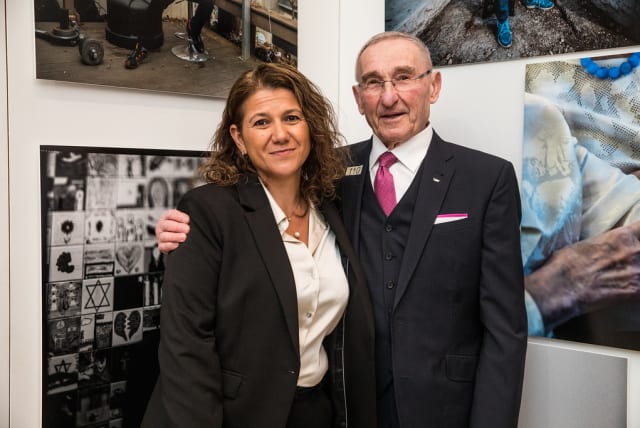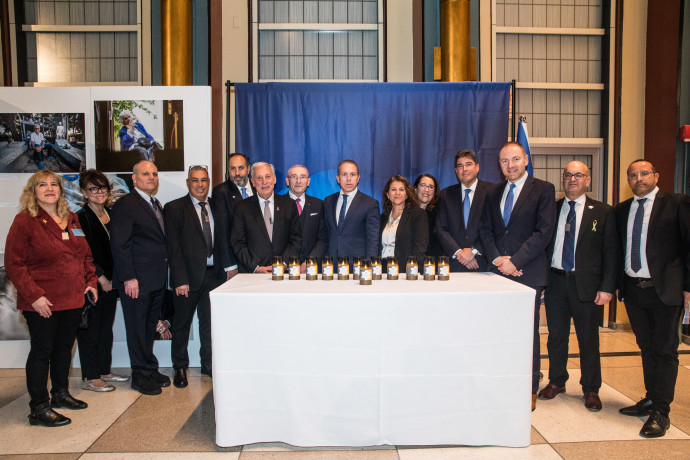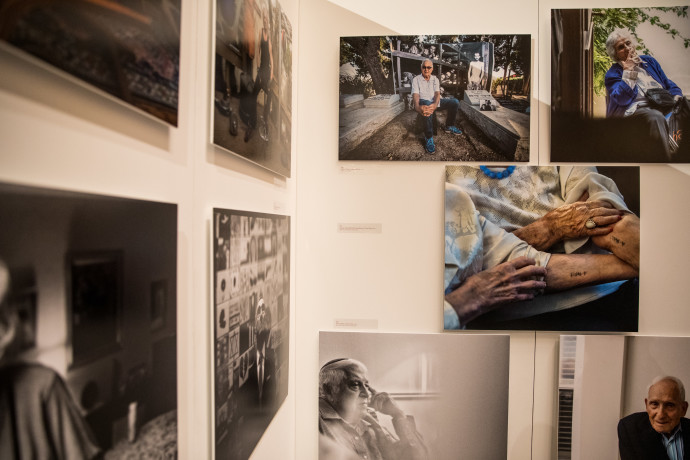A message of revival: ‘We will flourish and emerge victorious’

‘We’re Still Standing’ exhibition, marking International Holocaust Remembrance Day, introduced by KKL-JNF, Israel’s Permanent Mission to the UN, and Jewish Restitution Organization.
‘This is a message of revival, especially following the events of October 7,” affirmed KKL-JNF chairwoman Ifat Ovadia-Luski, following the “We’re Still Standing” special event held at the UN on January 27, International Holocaust Remembrance Day.
The exhibition was introduced by Israel’s Permanent Mission to the UN in cooperation with Keren Kayemeth LeIsrael-Jewish National Fund and the World Jewish Restitution Organization.
“The event at the UN is a salute to those who survived the Holocaust and rebuilt their lives in Israel. Some of them had to survive the horrifying terrorist attacks that took place on October 7,” said Ovadia-Luski. “The lesson that I learn from them is one of renewal. Although we are known as a people whose history is full of suffering, disturbances, and terror, we always knew – even in times of despair and depression – how to turn this into an opportunity for renewal, and today it is more relevant than ever.
“International Holocaust Remembrance Day is also the day of the liberation of Auschwitz. We finally emerged from the lowest point in the history of the Jewish people and established the State of Israel.
“This period is a very difficult time for Israel and the Jewish people in general, including the war, the terrible loss of human life, and, of course, the Israeli hostages who are in Gaza,” Ovadia-Luski continued. “The message we are constantly trying to convey – even in our visits to Jewish communities abroad – is that we will grow and become stronger from this. We have chosen renewal, and we also examine KKL-JNF, which in recent years has also entered the field of informal education and the complexities of Israeli society.
“We no longer deal only with the physical act of building the country and forestry but also touch the Israeli public, through education and reaching different segments of the population,” she said.
“We’re Still Standing,” which focuses on the stories of Holocaust survivors who demonstrated extraordinary resilience and rebuilt their lives, has taken on particular importance this year following the events of Oct. 7, in which entire families were annihilated simply because they were Jewish.
“When KKL-JNF established a special committee for Holocaust survivors as part of our education committee, it wasn’t because it’s just another sector of Israeli society that needs to be preserved and taken care of,” said Ovadia-Luski. “We know that, ultimately, time works against us, and these survivors are the last ones who can really tell us firsthand about the atrocities that took place in Nazi Europe. As part of this committee, we manage various activities for the survivors, such as taking them on special tours, providing holiday gift packages, and, of course, assisting populations in economic or psychological distress.”
Before attending the main event in New York, Ovadia-Luski visited Jewish communities in France against the backdrop of a growing wave of antisemitism.
“When I was in a Jewish school in Paris, we discussed planting and how growth doesn’t come immediately; it requires patience and perseverance,” she said. “This is a message that is also true of our situation today in the world. In the end, things will work out, but this will not happen unless we plant, and it will not happen instantly. We need patience. The history of Israel is full of atrocities committed against the Jewish people. Today, we must focus on the history of our renewal.
“Diaspora Jews have a great deal of hope, and they rely on the State of Israel. They know that we are a strong people, and it is very beautiful now to see the Jewish people united. It is a very moving event.”
An essential and extraordinary production
On January 27, the “We’re Still Standing” photographic exhibition was launched, which includes 34 unique photographs that tell of the triumph of the lives of Holocaust survivors – selected from a collection of 400 photos taken by 320 international photographers from 30 countries. Photographers Jim Hollander and Rina Castelnuovo initiated the project, which has been incorporated into a book in memory of Holocaust survivors and presented at the event.
“This is an extraordinary and vital production of photographs published over the past five years in dozens of countries,” said KKL-JNF Acting CEO Yuval Yenni. “It is important to give credit to the Israeli delegation to the UN, after three and a half challenging months experienced by Israeli society. It is symbolic to mark International Holocaust Remembrance Day in this way, especially to show support for Jewish communities against the background of rising antisemitism. It is probably no coincidence that on January 25 we marked Tu Bishvat, the holiday that symbolizes the renewal and the establishment of the roots of the Jewish people.
“Since the beginning of the war, KKL-JNF has been assisting the residents of the Gaza border communities and the South,” he noted. “We volunteered our assistance, with financial help in the first week of the fighting to the heads of councils and communities, in addition to the millions of shekels for equipment for emergency squads and donations of ambulances, through the Association for Israel’s Soldiers, to the southern communities.”
Odeya Bilig, who heads the community, immigrant, and special needs initiatives in KKL-JNF’s Education and Community Division, works closely with Holocaust survivors in Israel. She said that working with Holocaust survivors on an intensive basis began during the corona pandemic. “Even before that, the issue of loneliness arose, but the pandemic made it even more difficult for them to deal with it. We started joint activities in order to create opportunities for them to do things together and to create a shared experience that would include values of the Land of Israel, nature, and heritage. This came from the understanding that these activities strengthen them.
“Every year, we offer organized and experiential nature tours at heritage sites for Holocaust survivors that tell the story of the Land of Israel. We are present in all communities, together with organizations of Holocaust survivors and various nonprofit organizations. In addition, on Rosh Hashanah and Passover, we distribute food packages to 2,000 Holocaust survivors in need, from Israel’s geographic and social periphery. The distribution is carried out with volunteers, youth, and students and in cooperation with various organizations. This creates an intergenerational encounter, and it is very significant, especially when it comes to Holocaust survivors.
“The distribution of food packages makes them especially happy during the holidays. One of the survivors told us that he hid in the forests during the Holocaust, and in his experience the forest saved his life. For him, hiding in the forest was accompanied by feelings of fear and anxiety. Now he feels that, together with the tours and the celebrations on Tu Bishvat, when he talks about the connection to the forests it allows him to derive a positive experience from the forest and to make a correction of sorts.”
Holocaust survivors on Oct. 7
Esti Goldwasser, director of the International Relations Department of KKL-JNF’s Fundraising and External Relations Division, emphasized the importance of holding the event at the United Nations and the impact of the events of Oct. 7 on the community of Holocaust survivors in Israel.
“Many ambassadors from various countries participated in the event, and it was an opportunity to link the Holocaust horror experiences to the horrors that happened on October 7. Unfortunately, there were incidents there that reminded us very much of the Holocaust. It is impossible to ignore the difficult stories of Holocaust survivors who, after World War II, immigrated to Israel to build their homes in a safe, protected land and were forced to endure these pogroms again, this time on kibbutzim in Israel.
“The photo exhibit brought up the stories of the survivors of the events of the Black Shabbat of October 7, such as that of Moshe Ridler, the ‘grandfather of Holit,’ a 91-year-old survivor who was murdered by terrorists. Or the story of Ruth Haran, who survived both the Holocaust and the massacre at Kibbutz Be’eri but whose family members were murdered and some kidnapped. They once again had to endure their experience of childhood trauma; part of the significance of this event is to make these stories accessible to the world.
“For KKL-JNF, this event is a continuation of the organization’s ongoing activities throughout the generations, honoring the Holocaust victims, survivors, and Righteous Among the Nations. Holocaust remembrance is in our hearts, and the connection between the organization and the Holocaust is very deep. In fact, KKL-JNF has a special Holocaust survivor committee, led by David Yaari, KKL-JNF vice chairman.
“Since World War II, we have strived to strengthen Holocaust survivors and commemorate its victims. We connect the people of Israel to the Land of Israel. The survivors who made their way to Israel requested that KKL-JNF plant trees in memory of their loved ones. A total of six million trees were planted in Martyrs Forest in the Jerusalem Hills; and in various forests throughout the country, groves were planted commemorating Jewish communities destroyed in the Holocaust.”
And, of course, the iconic Blue Box: “The Blue Box is one of KKL-JNF’s most enduring symbols and has been in Jewish homes, organizations, and schools since the establishment of the organization over 122 years ago. There are testimonies from the ghettos that the Blue Boxes were found there – empty, of course – but for the Jews who experienced the Holocaust, the Blue Box and what it stood for was a ray of hope for a better future.
“This is what KKL-JNF wants to provide – a better future for the Jewish people and the Land of Israel.”
This article was written in cooperation with KKL-JNF.
Translated by Alan Rosenbaum.
Jerusalem Post Store
`; document.getElementById("linkPremium").innerHTML = cont; var divWithLink = document.getElementById("premium-link"); if (divWithLink !== null && divWithLink !== 'undefined') { divWithLink.style.border = "solid 1px #cb0f3e"; divWithLink.style.textAlign = "center"; divWithLink.style.marginBottom = "15px"; divWithLink.style.marginTop = "15px"; divWithLink.style.width = "100%"; divWithLink.style.backgroundColor = "#122952"; divWithLink.style.color = "#ffffff"; divWithLink.style.lineHeight = "1.5"; } } (function (v, i) { });


